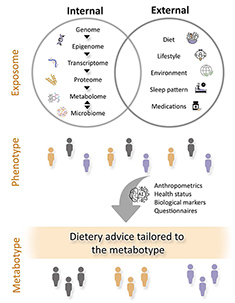PhD defence: Personalized dietary Management of Obesity and Related Metabolic Disorders in Adults
Mona Adnan Aldubayan
PhD thesis
Combating the obesity epidemic is one of the greatest health challenges of modern era. There is no consensus on the ideal dietary plan for controlling body weight and inducing weight loss, as people respond differently to the same treatment. This variability can be attributed to factors like genetics, food absorption, metabolism, and behavior.
Tailoring dietary treatments according to individual metabolic profiles, rather than using a one-size-fits-all approach, shows promise for optimizing obesity treatment. As highlighted by Garrod's concept of "biochemical individuality" over a century ago: “…just as no two individuals of a species are absolutely identical in bodily structure, neither are their chemical processes carried out on exactly the same lines”.
This PhD project investigated the weight loss efficacy of the European PREVENTOMICS platform that provides personalized nutritional plans to individuals with overweight or obesity. Using machine-learning techniques, the platform classified 100 individuals into five plant-based diet clusters based on their metabolic profile and genetic background.
A randomized control intervention for 10 weeks found no additional benefits in personalizing the diet compared to using a generic approach. The personalized and control treatments were predominantly plant-based diets, and both were equally effective in improving body weight and overall health. In addition, classifying participants based on their baseline gut microbial taxa of Prevotella to Bacteroides ratio did not predict weight loss outcomes.
The clusters supplemented with inulin-type fructans on top of this naturally high fiber diet experienced changes in gut microbiome composition (with selective growth of Bifidobacterium and Faecalibacterium) and reduced microbial diversity, coupled with attenuation of certain cardiometabolic benefits.
In summary, this PhD thesis found that personalized nutrition based on metabotyping did not prove to be superior to general dietary guidelines for successful weight loss and improved health outcomes. Future studies should assess the efficacy and cost-effectiveness of more simplified precision nutrition methods while validating weight loss biomarkers. Interventions should consider behavior and environmental factors contributing to obesity for better weight control. A comprehensive, holistic, and interdisciplinary approach is crucial to effectively combat obesity.
Download Table of contents; Publications; Summary; Summary in Danish.
2023, 136 pages.
Time
20 October 2023, 13:00
Place
Festauditoriet 1-01, Bülowsvej 17. 1870 Frederiksberg C
Opponents
Professor Lars Ove Dragsted (chair), Department of Nutrition, Exercise and Sports, University of Copenhagen, Denmark.
Associate Professor Michael Chourdakis, School of Medicine, Faculty of Health Sciences, Aristotle University of Thessaloniki, Greece.
Professor Rikard Landberg, Head of Food and Nutrition Science Division, Department of Biology and Biological Engineering, Chalmers University of Technology, Sweden.
Main supervisor
Professor Faidon Magkos, Department of Nutrition, Exercise, and Sports, Faculty of Science, University of Copenhagen, Denmark.
Co-supervisors
Senior Scientific Manager Mads Fiil Hjorth, Obesity and Nutritional Sciences, Novo Nordisk Foundation, Denmark.
The thesis is available for inspection at the library, Nørre Allé 51, DK-2200 Copenhagen N.

